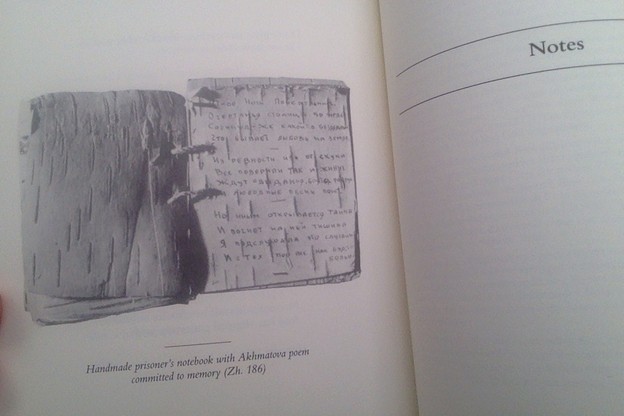Twenty-six items from Special Collections (w)
Exhibit ‘W’: Russian. (Anna Akhmatova, ['The twenty-first. Night. Monday.'], 1917)

Bibliography: The image above is from The Complete Poems of Anna Akhmatova: Expanded Edition, translated by Judith Hemschemeyer, edited by Roberta Reeder (Zephyr Press, 1992), page 770. The poem below originally appeared in Akhmatova's book White Flock (Petrograd, 1917).
Comment: Noam and Batya were over, and I was showing them the photograph above [caption: "Handmade prisoner's notebook with Akhmatova poem committed to memory (Zh. 186)"]. We accorded this poem a great deal of authority, given it was copied out of somebody's head, in the gulag. We were dying to know what in the world the poem was saying. Noam and I had some Russian, and we were ecstatic to find we could more or less understand the first line. There was some fuss, finding the piece in that huge book, but when we did find it we were quite satisfied. See below.
I had to go to a different book to get the Russian original. I thought it might be pleasant to memorize it and recite it next time I saw my friends. One year of Russian isn't much Russian, though. I had to look up 90% of the words to see where the stress falls. But that's how I discovered the piece is in anapestal trimeter. (I always bring this up when English speakers assert that anapests are inherently comic. The dead-serious Mandelshtam poem I have memorized is anapestal too.)
It remains to be said that the literal version at the bottom of this post is my own. It's not just a dictionary translation, though. It's the translation I kept "spontaneously" reproducing, when I would force people to listen to me reciting the Russian. I thought I was merely repeating the Judith Hemschemeyer translation verbatim, but when I wrote my version out and actually checked it against Hemschemeyer, I found my thing followed Akhmatova's rhythm more.
One other thing. I am posting this precisely today because today is the only "Monday the 21st" that falls during my tenure as a guest curator for Jacket2. The poem is ninety-nine years old. Akhmatova was around twenty-eight when she wrote it.
[The Russian original]
Двадцать первое. Ночь. Понедельник.
Очертанья столицы во мгле.
Сочинил же какой-то бездельник,
Что бывает любовь на земле.
И от лености или от скуки
Все поверили, так и живут:
Ждут свиданий, бояться разлуки
И любовные песни поют.
Но иным открывается тайна,
И почиет на них тишина…
Я на это наткнулась случайно
И с тех пор все как будто больна.
•
[transliterated into Roman letters:]
Dvadtsat' pervoe. Noch'. Ponedel'nik.
Ochertan'ya stolitsï vo mgle.
Sochinil zhe kakoy-to bezdel'nik,
Chto bïvaet lyubov' na zemle.
I ot lenosti ili so skuki
Vsyo poverili tak i zhivut:
Zhdut svidaniy, boyatsya razluki
I lyubovnïe pesni poyut.
No inïm otkrïvaetsya tayna,
I pochiet na nikh tishina . . .
Ya na eto natknulas' sluchayno
I s tekh por vso kak budto bol'na.
[Literal version:]
The twenty-first. Night. Monday.
The outlines of the capital are in mist.
Some good-for-nothing invented the notion
That love exists on the earth.
And whether from boredom or from stupidity,
Everyone believed it, and here's how they live:
Looking forward to meetings, dreading separations,
And singing little love songs . . .
But the secret will be imparted to the others,
And a hush will fall over them all.
I stumbled upon it by accident,
And since then—I've been a little bit sick.
•
Twenty-six items from Special Collections